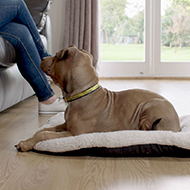
Pet owners urged to prepare for leaving their dogs alone for long periods.
One in 10 pet dogs developed separation-related behaviours during the pandemic that they did not previously have, according to new research.
A survey carried out by Dogs Trust between May and October 2020 tracked the impact of the pandemic on some 2,000 dog owners and their four-legged friends.
The results show that 10 per cent of the dogs who had previously been happy with being left alone developed separation-related behaviours (SRBs) as the coronavirus restrictions eased.
Some of the new SRBs that developed when dogs were left alone were barking, howling, pacing, toileting, and breaking household things. According to Dogs Trust, these behaviours may be damaging to both dog owners and also canine welfare, because they suggest that the dog is in a negative emotional state.
The findings suggest that between 17 per cent and 22 per cent of pet dogs have SRBs. However, without remote recording equipment, it can be hard to determine what the dogs are actually up to while alone - and this could be an underestimation of the actual figures.
In more positive findings, the survey showed that owners are not leaving their dogs alone for as long as they were before the pandemic. Half of the dogs with SRBs before COVID-19 showed no signs of them in the eight months that followed.
Jenna Kiddie, head of canine behaviour at Dogs Trust, said the findings highlight the importance of pet owners preparing their animals for being left alone for long periods again.
“With working from home guidance easing throughout the country, it’s likely that more dogs will have less company at home again, meaning more time alone," she said. "It’s important that we prepare our dogs for this change to prevent separation-related behaviour problems from developing.
“One of the most common reasons dogs are handed into Dogs Trust is behaviour-related issues that could have been prevented early on. A rise in problematic behaviours due to lockdown measures, such as separation anxiety, could mean families feel they have no other option but to give up their dog.”



 The BSAVA has opened submissions for the BSAVA Clinical Research Abstracts 2026.
The BSAVA has opened submissions for the BSAVA Clinical Research Abstracts 2026.